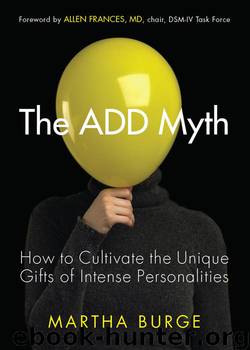The ADD Myth by Martha Burge

Author:Martha Burge
Language: eng
Format: mobi, epub
ISBN: 9781609256395
Publisher: Red Wheel Weiser Conari
Published: 2014-07-09T05:32:08+00:00
CHALLENGES OF INTELLECTUAL INTENSITY
Intellectual intensity is not without its challenges. Having brains that work differently impacts almost every area of life, but nothing is more strongly affected than our relationships. Our thought patterns, being more complex and diverse than those of our nonintense friends and family, can lead to frustrations for all concerned.
Moving Too Quickly
In conversation, one of the most common characteristics of intellectual intensity is moving from one subject to the next as we follow the intricate associations in our brains. These perceived changes of subject are confusing and sometimes frustrating to a less intense person trying to keep up. The connection between one subject and the next, while obvious to us, sometimes leaves the other person behind, bewildered by our ramblings.
Sometimes information comes to us so quickly that others can't understand how we do it. The capacity to take in and retrieve information quickly can intimidate others. It can cause them to be a little uncomfortable because they don't understand it. It can even cause them to be suspicious or distrustful. We are different in so many ways that people often don't understand us, and as a result they quite naturally feel unable to predict our actions. An inability to predict is threatening. When a person senses that you may be much smarter than they, the need to understand your moral character becomes very important. A smart person who is kind and caring is much less threatening than a smart person who doesn't really care about other people. Any slight indication of less-than-perfect morals is amplified due to your perceived intellectual power. This can cause people to take seemingly unwarranted shots at us. There is a desire to knock us down a bit. This is particularly true when the less intense person is in a position of authority over you or has an assessment that they “should” be smarter or better than you. To an intense person, these undeserved attacks only serve to distance us further. Introverts become more introverted. Extroverts become bolder.
The Trap of “Figuring It Out”
Another potential pitfall of intellectual intensity is derived from the confidence we have in our ability to think. Thinking works, problem solving is fruitful and enjoyable, and figuring it out is a natural strength that we recognize and use heavily. We have found such success with intellectual pursuits that we lean too heavily on “figuring it out,” regardless of the nature of the problem. The tendency to intellectualize emotional subjects or problems has two primary outcomes. First, since “figuring it out” doesn't work in the emotional domain, the exercise is a waste of time and energy. The failure can cause further emotional distress and feelings of helplessness. Second, the intellectual approach to emotional issues serves to support others' assessment of our character as cold and heartless. “Figuring it out” also doesn't work with aesthetic pursuits, although that doesn't stop a lot of people from trying it.
Stupid People
The single biggest challenge I hear about from intellectually intense people is the self-induced emotional distress brought on by “stupid” people.
Download
This site does not store any files on its server. We only index and link to content provided by other sites. Please contact the content providers to delete copyright contents if any and email us, we'll remove relevant links or contents immediately.
Periodization Training for Sports by Tudor Bompa(8273)
Why We Sleep: Unlocking the Power of Sleep and Dreams by Matthew Walker(6726)
Paper Towns by Green John(5191)
The Immortal Life of Henrietta Lacks by Rebecca Skloot(4588)
The Sports Rules Book by Human Kinetics(4388)
Dynamic Alignment Through Imagery by Eric Franklin(4217)
ACSM's Complete Guide to Fitness & Health by ACSM(4060)
Kaplan MCAT Organic Chemistry Review: Created for MCAT 2015 (Kaplan Test Prep) by Kaplan(4013)
Livewired by David Eagleman(3775)
Introduction to Kinesiology by Shirl J. Hoffman(3774)
The Death of the Heart by Elizabeth Bowen(3622)
The River of Consciousness by Oliver Sacks(3604)
Alchemy and Alchemists by C. J. S. Thompson(3522)
Bad Pharma by Ben Goldacre(3428)
Descartes' Error by Antonio Damasio(3279)
The Emperor of All Maladies: A Biography of Cancer by Siddhartha Mukherjee(3163)
The Gene: An Intimate History by Siddhartha Mukherjee(3098)
The Fate of Rome: Climate, Disease, and the End of an Empire (The Princeton History of the Ancient World) by Kyle Harper(3067)
Kaplan MCAT Behavioral Sciences Review: Created for MCAT 2015 (Kaplan Test Prep) by Kaplan(2986)
